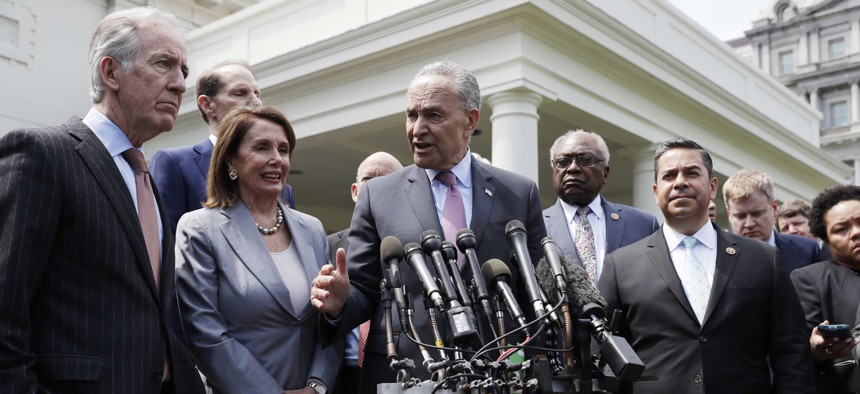Trump and Democrats Agree to More Talks on $2 Trillion Infrastructure Package

Speaker of the House Nancy Pelosi of Calif., Senate Minority Leader Sen. Chuck Schumer of N.Y. and other Democrats, talk to the media after meeting with President Donald Trump in the Cabinet Room of the White House, Tuesday, April 30, 2019, in Washington. AP Photo/Evan Vucci

Connecting state and local government leaders
They're slated to convene again in three weeks to discuss funding options.
President Trump and top congressional Democrats have agreed to move ahead with discussions for a $2 trillion infrastructure package, according to Senate Minority Leader Chuck Schumer.
Schumer, House Speaker Nancy Pelosi and other Democrats met with Trump at the White House on Tuesday to discuss infrastructure. "We agreed on a number, which was very, very good, $2 trillion for infrastructure," Schumer said after the meeting.
"Even the president was eager to push it up to $2 trillion," he added.
The Democrats said they and Trump settled on plans for another meeting in three weeks where the president would present his ideas about how to pay for new spending on public works.
"We told the president that we needed his ideas on funding," Schumer said. "Where does he propose that we can fund this? Because certainly in the Senate if we don't have him on board, it'll be very hard to get the Senate to go along."
White House press secretary Sarah Sanders in a statement also said there would be another meeting in three weeks to "discuss specific proposals and financing methods" and called Tuesday's meeting "excellent and productive."
But other members of the president's team pointed to reasons cooperation between Democrats and Trump could be difficult.
The White House last year presented an infrastructure plan that called for $200 billion of direct federal funding. But it failed to make serious headway in Congress. Administration officials said when that plan was released they were aiming to combine the federal funding with state, local and private dollars to drive $1.5 trillion in total investments.
A sticking point for major infrastructure legislation has been where the money to pay for it will come from at the federal level.
One possibility, at least for highway projects, is raising taxes on gas and diesel fuel. Business groups like the U.S. Chamber of Commerce and the American Trucking Associations have backed this option.
But Democrats who attended Tuesday's meeting, and White House officials, have described a prospective package that would cover more than roads and bridges, also supporting projects that have to do with waterworks, the power grid, airports and broadband.
And a Democratic official close to Schumer said the Senate leader would not consider a gas tax increase unless Republicans consider undoing some of their tax cuts for corporations and wealthy Americans, The Washington Post reported on Monday.
Kellyanne Conway, a counselor to the president, when asked on Tuesday whether the president supports raising the gas tax to pay for infrastructure spending, replied: "The president has not said that."
"This president is the guy who lowers taxes," she said. "There are many different ways to pay for it," Conway added. "You could have private-public partnerships. I know the Democrats will want to raise taxes."
Conway said apart from identifying funding sources, another challenge is defining what infrastructure will be included under the umbrella of any legislation that eventually emerges.
“We think infrastructure is what America thinks infrastructure is, which is that they don't want bridges to be in disrepair and roads to be crumbling and the dangers that go with that,” she said.
Conway suggested some communities around the U.S. believe federal infrastructure efforts should also be about “building schools and hospitals, or dog parks and more bike trails.”
“So maybe that's for negotiation,” she added.
Meanwhile, at an event in Beverly Hills, California, acting White House Chief of Staff Mick Mulvaney highlighted the environmental permitting and approval process for projects as a hurdle for talks, noting the administration wants to slash the amount of time it takes.
“How are you going to pay for it? Sources of revenue," he said at the Milken Institute Global Conference, "that's not where it breaks down."
“You want to spend money, I want to spend money,” he added, referring to Democrats and Republicans. “I want to change the environmental laws. How do you feel about that as a Democrat? It's going to be a very difficult place for some of them to go.”
“I think that may be the place where the discussions break down,” he said.
Trump, according to Mulvaney, is “not interested in spending a trillion dollars now for something that's not going to get built until 2029.”
Mulvaney sees another problem as well: efforts by congressional Democrats to check the president through oversight hearings could cause friction that derails possible progress on infrastructure.
"To have an impeachment hearing on Monday, say, and then to think you're going to talk infrastructure on Tuesday, that's not how the world works, let alone Washington, D.C.," he said. "They either have to choose to legislate or litigate."
Pelosi, flanked by fellow Democrats after the Tuesday White House meeting, said that when it comes to infrastructure, “we hope to go forward in a very nonpartisan way.”
Mulvaney says questions about a funding and financing could get worked out “in a real negotiation.”
“Is this a real negotiation, I think remains to be seen,” he added.
This story has been updated after publication with additional comment.
Bill Lucia is a Senior Reporter for Route Fifty and is based in Olympia, Washington.

NEXT STORY: USDA Accepting Applications to Fund Rural Broadband Services





